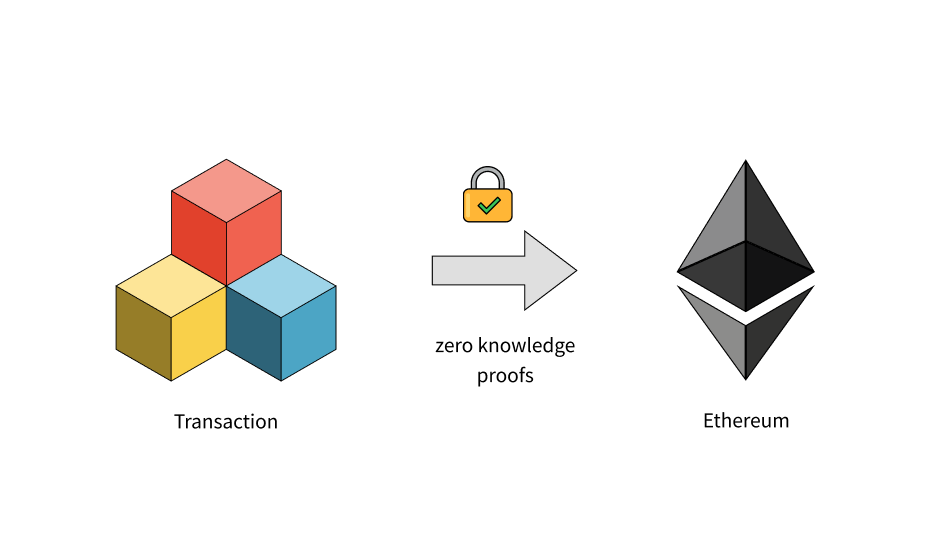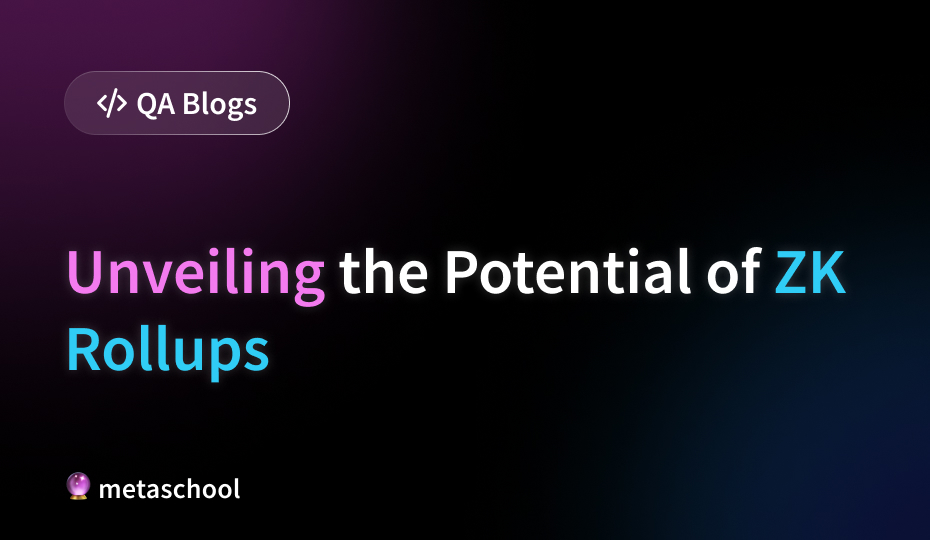Table of Contents
Zero-knowledge rollups (ZK-rollups) simplify transactions by grouping them and handling them off the main blockchain. This off-chain processing reduces the amount of information that needs to be recorded on the blockchain.
In this article, we’ll dive into these rollups. We’ll explore how they work, their interaction with Ethereum, and their potential to revolutionize decentralized finance.
Deciphering ZK Rollups: A Primer
Let’s understand how ZK Rollups work using a real-world example:
Imagine you’re at a busy restaurant, and you want to pay your bill. Instead of paying each item separately, you decide to group everything and pay all at once. That’s kind of how ZK-rollups work!
In this scenario, ZK-rollups are like a smart waiter who collects everyone’s orders, calculates the total bill, and presents it to you in a simplified form. They also provide a special receipt that proves the total is correct without revealing the details of each order. This receipt is like the cryptographic proof used in ZK-rollups.
Now, when it’s time to settle the bill, you can quickly verify the total and pay without needing to know what each person ordered. Similarly, in ZK-rollups, Ethereum can quickly verify the transactions’ total without needing to know all the nitty-gritty details of each transaction.
Plus, ZK-rollups are efficient with data. They use smart techniques, like abbreviating addresses, to make the receipt smaller and save space. This helps keep costs down for everyone involved.
So, in simple terms, ZK-rollups are like a smart waiter at a restaurant, helping you pay your bill quickly and efficiently, while also keeping your orders private.
🔥 Check this course out: Build a Semi-Fungible ERC404 Tokens’ Marketplace
Exploring the Connection: How Ethereum and ZK Rollups Interact
Let’s continue with our busy restaurant analogy. Consider you have a big ledger at your rest where you record all the orders and payments. This ledger represents the Ethereum blockchain, a secure and immutable record of transactions.
Now, to help manage the restaurant more efficiently, you also have a special folder where you keep detailed notes and calculations about your orders, inventory, and other important information. This folder represents the ZK-rollup chain, an off-chain protocol that complements the Ethereum blockchain.

In this setup:
- On-chain contracts: These are like the rules and procedures you’ve set in place to ensure the smooth operation of your restaurant. They manage the ledger (Ethereum blockchain), keeping track of all the orders, payments, and inventory changes. Just like in the real world, these contracts handle everything from storing transaction records to verifying the accuracy of each transaction.
- Off-chain virtual machine (VM): This is like your back office where you handle additional tasks and calculations away from the hustle and bustle of the restaurant floor. It’s where you process orders, update inventory, and manage other aspects of your restaurant’s operation. The ZK-rollup chain operates here, processing transactions off the main ledger (Ethereum blockchain) to improve efficiency and scalability.
ZK-rollups, like your special folder, offer a hybrid approach to scaling solutions. They work alongside the Ethereum blockchain, leveraging its security and immutability, while also providing additional flexibility and efficiency for processing transactions off-chain.
Weighing the Benefits and Drawbacks
ZK rollups come with their fair share of advantages and disadvantages, much like any groundbreaking technology. Let’s take a closer look at the pros and cons of these transformative scaling solutions:
Pros:
- Validity Proofs: Ensure the accuracy of off-chain transactions, preventing operators from executing invalid state transitions.
- Faster Transaction Finality: State updates are approved swiftly once validity proofs are verified on Layer 1 (L1).
- Trustless Security: Relies on cryptographic mechanisms for security, eliminating the need for trust in incentivized actors.
- Data Security: Stores necessary data on Layer 1 (L1), guaranteeing security, censorship-resistance, and decentralization.
- Capital Efficiency: Users enjoy greater capital efficiency and can withdraw funds from Layer 2 (L2) without delays.
- Dependable: Doesn’t rely on liveness assumptions, and users don’t need to validate the chain to protect their funds.
- Data Compression: Better compression techniques reduce costs and minimize rollup fees for users by publishing calldata more efficiently.
Cons:
- Costly Validity Proofs: Computing and verifying validity proofs can be expensive, potentially increasing fees for rollup users.
- Complexity: Building EVM-compatible ZK-rollups is challenging due to the complexity of zero-knowledge technology.
- Hardware Requirements: Producing validity proofs requires specialized hardware, which may lead to centralized control by a few parties.
- Centralization Risk: Centralized operators (sequencers) can influence the ordering of transactions, posing a risk to decentralization.
- Limited Participation: Hardware requirements may limit the number of participants, increasing the risk of malicious operators freezing the rollup’s state and censoring users.
- Trusted Setup: Some proving systems (e.g., ZK-SNARK) require a trusted setup, which if mishandled, could compromise a ZK-rollup’s security model.
🔥 Check this course out: Create a Token in Clarity on Stacks Blockchain
Conclusion
In conclusion, Zero-Knowledge (ZK) rollups offer a promising solution to Ethereum’s scalability challenges while providing enhanced security and efficiency. By leveraging cryptographic proofs and off-chain computation, ZK rollups streamline transactions, ensure data integrity, and expedite finality, thereby significantly improving the user experience on the Ethereum network.
Despite facing certain challenges such as high costs associated with validity proofs and the complexity of implementation, ZK rollups present a compelling path forward for Ethereum’s growth and evolution. Their ability to provide trustless security, data compression, and capital efficiency makes them a vital component of the blockchain ecosystem.
As Ethereum continues to advance, ZK rollups are poised to play a pivotal role in enabling broader adoption, powering decentralized applications, and facilitating innovative use cases across various industries. With ongoing research and development efforts aimed at addressing their limitations, ZK rollups stand as a beacon of promise, heralding a brighter future for decentralized finance and applications on the Ethereum blockchain.
Try it out and let us know how it went by tagging Metaschool on Social Media.
Follow us on –
🔮Twitter – https://twitter.com/0xmetaschool
🔗LinkedIn – https://www.linkedin.com/company/0xmetaschool/
👉 If what we do sounds interesting to you and can help you improve your skills, join us. Metaschool is hiring for tech roles. You can apply here.
